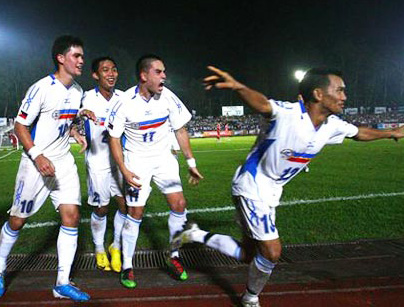Faith continues to fuel Azkals’ campaign

The team may lack the resources and the talent compared to the finest teams in the continent, but there’s never been a shortage in belief within the team.
The Azkals have even launched the “We Believe” campaign to drum up support for the team.
Stephan Schrock, the influential midfielder who plays in the second division in Germany, had to take a respite from his club duties to join the Azkals for the second leg in Manila tonight despite the Filipinos’ facing a 0-3 deficit against the heavily-favored Kuwait team.
“I would have never come here if I didn’t believe that we can do it,” said Schrock, who picked up two yellow cards against Sri Lanka that forced him out of the first leg in Kuwait last Saturday.
Schrock related how his club, Gruether Fuerth, kept asking why he wanted to return to Manila for the second leg when it seemed that Kuwait all but wrapped up the tie.
“In football, anything can happen,” said Schrock, pointing out his club’s recent result against a team from Frankfurt when they lost 2-3 after taking a 2-0 lead with 20 minutes remaining.
There are lots of reasons why football is called the “Beautiful Game.”
A moment of magic or a second of mediocrity can alter results. A loss of concentration even for a second could lead to a goal. The crossbar can separate the good from the great and to some extent, it was the case in the first leg at the Mohammed Al-Hammad Stadium in Kuwait where both Angel Guirado and Phil Younghusband got denied a goal each by the bar.
Brutal football
“The three goals we gave up in Kuwait shows how brutal football can be,” said Azkals coach Hans Michael Weiss.
Homegrown talents like Chieffy Caligdong, Roel Gener and Ian Araneta, who endured the pain of absorbing heavy losses to Asian powerhouses in the past, believe the tie is not lost yet.
“We know it’s difficult, but now is not the time to lose faith in ourselves and in our team,” said Caligdong, who skippered the team in the first leg of the tie in the absence of Aly Borromeo.
Gener and Araneta said the Azkals always relish the underdog label.
“That’s the beauty of the team when we are done, we never lose hope,” said Araneta.
The Azkals’ late goals have been the best proof of their never-say-die spirit. Down 0-1 against Timor Leste in the 2004 Tiger Cup, the Azkals drew firepower from Chieffy Caligdong in the final minutes to hammer out a dramatic 2-1 win, their first victory in the Tiger Cup. Last year in the Long Teng Cup, Araneta banged in a 92nd minute equalizer against Chinese-Taipei. The Azkals fought back from two goals down to tie Laos and equalized against Singapore right at the death in the Suzuki Cup.
Raised standards
But with the sport gaining ground in the Philippines, the standards have also been raised for the Azkals.
Weiss said the set up should improve for a team which has no established national league and has almost always been relying on players plying their trade abroad who only join the team a few days before tournaments.
Weiss said the team still has a lot of potential and given another year, would have had a better chance of getting past Kuwait.
“Everyone must remember that we are not a super team yet,” Weiss said, putting the Azkals’ success in perspective. “We know people have the right to criticize, but we ask for understanding that we have a long way to go.”
The German coach still longs for the day when he could have all of the talented Filipino players based in Europe and the best homegrown talents in a camp and just hone them into one cohesive unit.
For now though the Azkals will have to summon the belief that has taken them so far the past few months.
“If we leave everything on the field for the flag, then who knows what could happen,” said defender Rob Gier.
